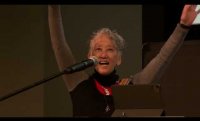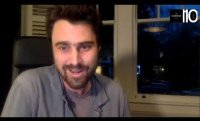Bring in the new month by applying to contests with a deadline of May 15! These awards include opportunities for poets of Asian heritage; women, transgender, and gender-nonconforming writers whose work advances social change; and novelists writing debut books set in the American South. Plus, don’t miss the chance to win a residency in Miami Beach, Florida, or Naples, New York. All contests offer a cash prize of $1,000 or more and two are free of cost to submit.
Academy of American Poets James Laughlin Award: A prize of $5,000 is given annually for a second book of poetry by a living poet to be published in the coming calendar year. The winner also receives an all-expenses paid weeklong residency at the Betsy Hotel in Miami Beach, Florida. Copies of the winning book are distributed to members of the Academy of American Poets. Aracelis Girmay, Solmaz Sharif, and Mai Der Vang will judge. Entry fee: None.
Academy of American Poets Lenore Marshall Poetry Prize: A prize of $25,000 is given annually for a poetry collection by a living poet published in the United States during the previous year. The winner also receives an all-expenses paid 10-day residency at the Glen Hollow cottage in Naples, New York. Copies of the winning book are distributed to members of the Academy of American Poets. Entry fee: $75.
American Poetry Review Stanley Kunitz Memorial Prize: A prize of $1,000 and publication in American Poetry Review is given annually for a single poem by a poet under the age of 40. The editors will judge. Entry fee: $15 (which includes a copy of the prize issue).
Crook’s Corner Book Prize Foundation Book Prize: A prize of $5,000 is given annually for a debut novel set in the American South. The author may live anywhere, but eligible novels must be set primarily in Alabama, Arkansas, Florida, Georgia, Kentucky, Louisiana, Maryland, Mississippi, North Carolina, Oklahoma, South Carolina, Tennessee, Texas, Virginia, West Virginia, or Washington, D.C. Self-published books are eligible, but books available only as e-books are not. Ben Fountain will judge. Entry fee: $35.
Gaudy Boy Poetry Book Prize: A prize of $1,500 and publication by Gaudy Boy, an imprint of the New York City–based literary nonprofit Singapore Unbound, is given annually for a poetry collection by an Asian writer. Yeow Kai Chai will judge. Entry fee: $10.
Leeway Foundation Transformation Awards: Awards of $15,000 each are given annually to women, transgender, or otherwise gender-nonconforming poets, fiction writers, and creative nonfiction writers in the Philadelphia area who have been creating art for social change for five or more years. Writers who have lived for at least two years in Bucks, Camden, Chester, Delaware, Montgomery, or Philadelphia counties, who are at least 18 years of age, and who are not full-time students in a degree-granting arts program are eligible. Entry fee: None.
Lost Horse Press Idaho Prize for Poetry: A prize of $1,000, publication by Lost Horse Press, and 20 author copies is given annually for a poetry collection by a U.S. poet. Dzvinia Orlowsky will judge. Entry fee: $28.
McGill University Montreal International Poetry Prize: A prize of $20,000 Canadian (approximately $15,728) and publication in the 2022 Montreal Poetry Prize Anthology is given biennially for a poem. Lorna Goodison will judge and Cameron Awkward-Rich, Heather Christle, Nabina Das, Liz Howard, Joanne Limburg, Conor O’Callaghan, Tanure Ojaide, Michael Prior, Medrie Purdham, Mark Tredinnick, and Rhian Williams will serve as jurors. Entry fee: $25 Canadian (approximately $20).
Pittsburg State University Cow Creek Chapbook Prize: A prize of $1,000, publication by Pittsburg State University, and 25 author copies is given annually for a poetry chapbook. Chen Chen will judge. Entry fee: $15.
Ploughshares Emerging Writer’s Contest: Three prizes of $2,000 each and publication in Ploughshares are given annually for a poem or group of poems, a short story, and an essay. Each winner also receives a consultation with the literary agency Aevitas Creative Management. Writers who have not published a book or a chapbook with a print run over 300 are eligible. Chen Chen will judge in poetry, Amelia Gray will judge in fiction, and Danielle Geller will judge in nonfiction. Entry fee: $24 (which includes a subscription to Ploughshares).
Visit the contest websites for complete guidelines, and check out the Grants & Awards database and Submission Calendar for more contests in poetry, fiction, and creative nonfiction.









